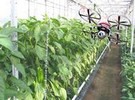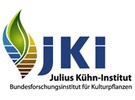Plant protection is much more than just spreading chemicals over large areas with a spray-trailer behind a tractor. For a long time now, an innovative research field has been behind all that. Now, drones drop useful enemies to harmful insects from the air. Special cameras detect pest infestation at an early stage. Trap systems independently identify the captured insects and report the catch to the owner. And weather forecast models use weather data to predict the probability of
fungal i nfections. All of this serves the purpose of integrated plant protection (IPM), which aims to reduce the use of chemical agents to a minimum by means of technical or biological processes, among other things, and thus to operate even more environmentally friendly.
nfections. All of this serves the purpose of integrated plant protection (IPM), which aims to reduce the use of chemical agents to a minimum by means of technical or biological processes, among other things, and thus to operate even more environmentally friendly.
However, there is still a long way to go before there can be any widespread application. The EU project SMARTPROTECT, in which the Julius Kühn Institute (JKI) and 15 other European partners are involved, aims to shorten this path. The aim of the project is to stimulate the flow of knowledge on innovative crop protection techniques between vegetable producers, consultants, authorities and researchers and to better network them throughout the EU. A user-friendly database on the Internet will be used to collect and make more effective use of advanced methods for integrated crop protection in vegetable production.
Costs, problems and added value of new systems
"In order for the knowledge to become common practice, it must be easy to find, comprehensibly prepared and easy to research," says Dr. Elias Böckmann of the JKI in Braunschweig. His focus group is responsible for the evaluation of innovative IPM techniques: "We collect all available information and use this as a basis to evaluate costs, problems and added value of new systems." Only techniques that are already available or at least close to market introduction are considered. This ensures that the database is a real help in practical work for farm managers and consultants in plant protection services. "We want to show, for example, which applications against insect pests in greenhouses are best suited to the needs of each farm, broken down by farm type and size," explains Böckmann.
At field days and other information events, the techniques and the website will be introduced to vegetable producers. At the end of the three-year funding period by the EU, the site will be integrated into EURAKNOS (EU agricultural knowledge base) and thus remain available in the long term.
EU research funding programme
The SMARTPROTECT ('SMART agriculture for innovative vegetable crop PROTECTion': harnessing advanced methodologies and technologies) project started at the end of January 2020 and will continue until 31 December 2022, with funding of almost 2 million euros from the EU's Horizon 2020 research funding programme.
It brings together 16 partners, coordinated by INAGRO in Belgium. The JKI is represented by its specialist institute for plant protection in horticulture and forestry and is responsible for the work package "Benchmarking of innovative plant protection techniques and methods".
Source: Informationsdienst Wissenschaft (IDW)For more information:
Dr. Elias Böckmann
Julius Kühn-Institut (JKI)
Inst. für Pflanzenschutz im Gartenbau und Forst
Messeweg 11/12, 38104 Braunschweig
Tel.: 0531 299 4441
elias.boeckmann@julius-kuehn.de
www.julius-kuehn.de
